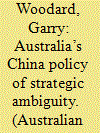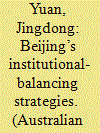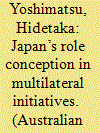| Srl | Item |
| 1 |
ID:
158740


|
|
|
|
|
| Summary/Abstract |
History, little understood, shows that for 55 years a policy of ‘strategic ambiguity’ about the application of the Australia, New Zealand, United States Security Treaty to Taiwan, a flashpoint in Asia, served Australia well. Return to it could lessen the risks of embroilment in any Sino-American war in East Asia, and enhance Australia’s middle-power options.
|
|
|
|
|
|
|
|
|
|
|
|
|
|
|
|
| 2 |
ID:
158724


|
|
|
| 3 |
ID:
158731


|
|
|
|
|
| Summary/Abstract |
China has in recent years been actively engaged in multilateral diplomacy. From the Shanghai Cooperation Organisation and the Conference on Interaction and Confidence Building Measures in Asia to the Asian Infrastructure Investment Bank and the One Belt, One Road initiative, Beijing is pursuing strategies and promoting norms that are viewed as concerted efforts by China to challenge some of the key institutional arrangements of the existing international order. This article seeks to discuss these contentious issues and assess the rationales, approaches and implications of Chinese diplomacy in initiating and promoting what can be considered as institutional-balancing strategies. The author suggests that the rationales behind these Chinese strategies have as much to do with Beijing’s shifting priorities and the need to address them as with reflecting a degree of dissatisfaction with existing multilateral institutions. And there are more marked differences in Chinese motivations and modalities in security arenas than in economic areas. However, it would be overstating Beijing’s intentions and capabilities if these China-sponsored initiatives are viewed as direct challenges to the existing international and regional orders.
|
|
|
|
|
|
|
|
|
|
|
|
|
|
|
|
| 4 |
ID:
158735


|
|
|
|
|
| Summary/Abstract |
This article examines Japan’s role conception in its multilateral commitments to the Asia-Pacific after the global financial crisis in 2008. The Hatoyama government launched an East Asian Community initiative, which aimed to assume a kingmaker role in creating a new order in East Asia. However, the East Asian Community initiative did not develop due to stress on self-reliance and distance from partnership with the USA. The Abe government sought to play a dual role in its major multilateral commitments. On the one hand, the government sought to play a follower role in enhancing the position of the East Asia Summit with an eye to consolidating the US-based institutional framework. On the other, Abe’s new multilateral initiative of the Free and Open Indo-Pacific represented Japan’s kingmaker role in maintaining a free and open maritime regime, and to keep a liberal and open economic regime under the emergence of the Trump administration.
|
|
|
|
|
|
|
|
|
|
|
|
|
|
|
|
| 5 |
ID:
158738


|
|
|
|
|
| Summary/Abstract |
Theoretically, this article reveals the long-term risk for local non-governmental organisations (NGOs) of participating in transnational advocacy networks (TANs), accepting money from foreign sources and throwing ‘boomerangs’ internationally—a strategy used by local NGOs to seek international allies to pressure repressive and unresponsive states at home. Focusing primarily on the suppression of environmental NGOs that oppose natural-resource extraction, this article examines three cases—Russia, India and Australia—to illuminate the consequences of this trend for local civil society and TANs. It also documents a global trend towards states depicting local NGOs with international linkages as subversive agents of foreign interests, justifying legal crackdowns and the severing of foreign funding and ties. State framing of NGOs as agents of foreign interests is repressing local environmental activism, depoliticising civil society and weakening international NGO alliances—a conclusion with far-reaching consequences for the future of TANs, local NGOs and environmental activism.
|
|
|
|
|
|
|
|
|
|
|
|
|
|
|
|
| 6 |
ID:
158729


|
|
|
|
|
| Summary/Abstract |
The dawn of the twenty-first century witnessed a new wave of multilateral initiatives in the Asia-Pacific. By integrating institutional balancing theory and role theory, the author proposes a new theoretical framework—‘balance of roles’—to explain the variations in institutional strategies by different states. It is argued that a state’s role conception will shape its institutional balancing strategies in an order transition period. An order defender, like the USA, is more likely to adopt exclusive institutional balancing to exclude its target from its dominated institutions. An order challenger, such as China, will choose both inclusive and exclusive institutional balancing to maximise its own power and legitimacy in a new international order. As a kingmaker, a proactive second-tier state is more likely to pick an inter-institutional balancing strategy to initiate new institutions for competing for influence with existing institutions. An institutionalised order transition might be more peaceful than widely perceived.
|
|
|
|
|
|
|
|
|
|
|
|
|
|
|
|